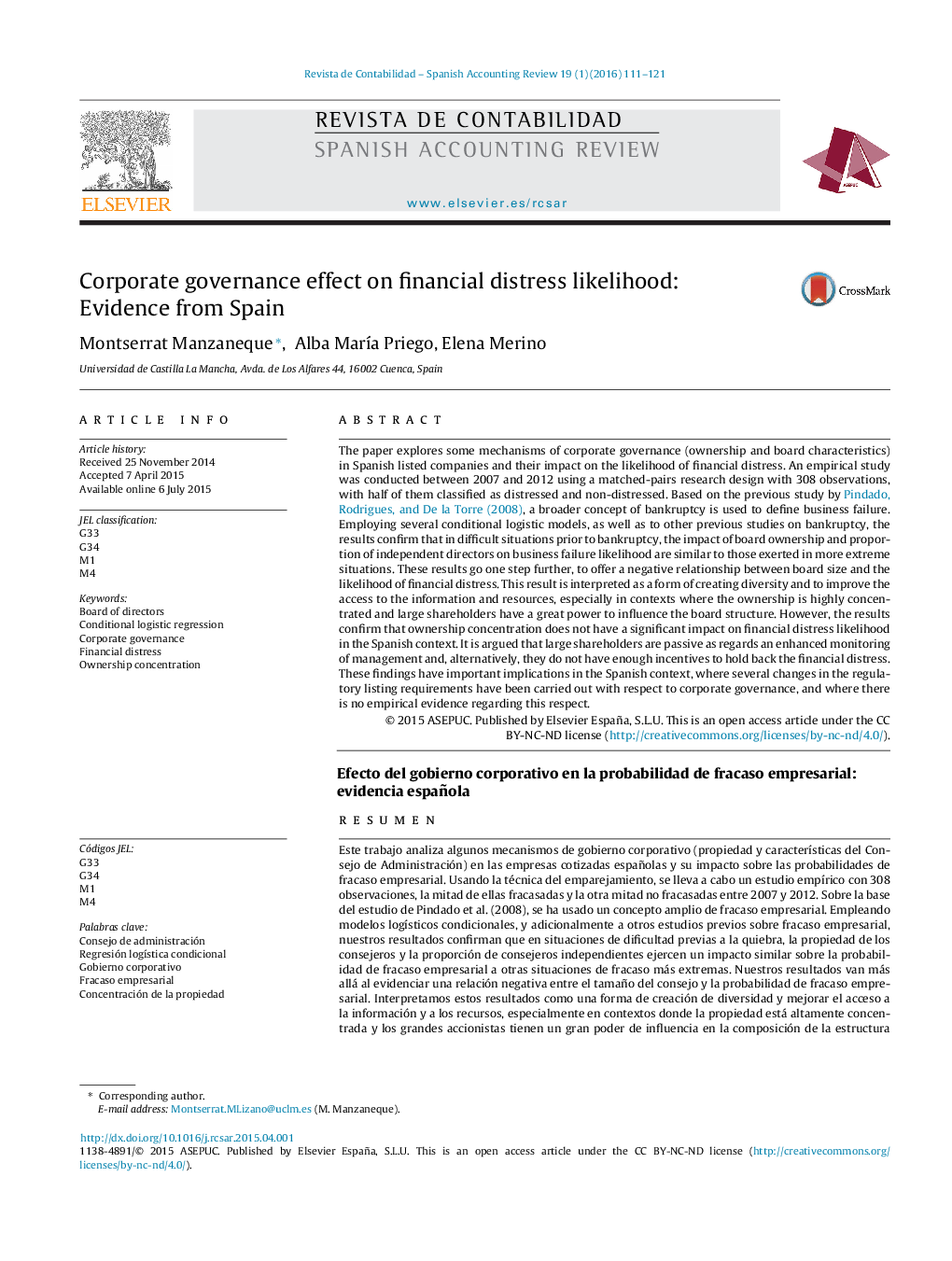| کد مقاله | کد نشریه | سال انتشار | مقاله انگلیسی | نسخه تمام متن |
|---|---|---|---|---|
| 1006797 | 938341 | 2016 | 11 صفحه PDF | دانلود رایگان |
کلمات کلیدی
مقدمه
حاکمیت شرکتی و بحران مالی. بررسی پیشینه(ادبیات) و توسعه فرضیه ها
مالکیت
هیئت مدیره
استقلال هیئت مدیره
جدایی نقش رئیس و مدیر ارشد اجرایی
تعداد مدیران مستقل
اندازه هیئت مدیره
روش شناسی
انتخاب نمونه و داده
جدول1: ترکیب شرکت های جمعیت و نمونه بر اساس نوع صنعت
جدول 2: توزیع نمونه بر اساس سال
جدول 3: تعریف و متغیرهای علامت های مورد انتظار
نتایج
تجزیه و تحلیل توصیفی و آزمون های تک متغیری
جدول 4: خلاصۀ آمار نمونه
جدول 5: آزمون مقایسۀ میانگین برای شرکت های بحران زده و بحران نزده
جدول 6: ماتریس همبستگی
جدول 7: مدل های رگرسیون لجستیک شرطی
تجزیه و تحلیل جانبی یا اضافی
نتیجه گیری
The paper explores some mechanisms of corporate governance (ownership and board characteristics) in Spanish listed companies and their impact on the likelihood of financial distress. An empirical study was conducted between 2007 and 2012 using a matched-pairs research design with 308 observations, with half of them classified as distressed and non-distressed. Based on the previous study by Pindado, Rodrigues, and De la Torre (2008), a broader concept of bankruptcy is used to define business failure. Employing several conditional logistic models, as well as to other previous studies on bankruptcy, the results confirm that in difficult situations prior to bankruptcy, the impact of board ownership and proportion of independent directors on business failure likelihood are similar to those exerted in more extreme situations. These results go one step further, to offer a negative relationship between board size and the likelihood of financial distress. This result is interpreted as a form of creating diversity and to improve the access to the information and resources, especially in contexts where the ownership is highly concentrated and large shareholders have a great power to influence the board structure. However, the results confirm that ownership concentration does not have a significant impact on financial distress likelihood in the Spanish context. It is argued that large shareholders are passive as regards an enhanced monitoring of management and, alternatively, they do not have enough incentives to hold back the financial distress. These findings have important implications in the Spanish context, where several changes in the regulatory listing requirements have been carried out with respect to corporate governance, and where there is no empirical evidence regarding this respect.
ResumenEste trabajo analiza algunos mecanismos de gobierno corporativo (propiedad y características del Consejo de Administración) en las empresas cotizadas españolas y su impacto sobre las probabilidades de fracaso empresarial. Usando la técnica del emparejamiento, se lleva a cabo un estudio empírico con 308 observaciones, la mitad de ellas fracasadas y la otra mitad no fracasadas entre 2007 y 2012. Sobre la base del estudio de Pindado et al. (2008), se ha usado un concepto amplio de fracaso empresarial. Empleando modelos logísticos condicionales, y adicionalmente a otros estudios previos sobre fracaso empresarial, nuestros resultados confirman que en situaciones de dificultad previas a la quiebra, la propiedad de los consejeros y la proporción de consejeros independientes ejercen un impacto similar sobre la probabilidad de fracaso empresarial a otras situaciones de fracaso más extremas. Nuestros resultados van más allá al evidenciar una relación negativa entre el tamaño del consejo y la probabilidad de fracaso empresarial. Interpretamos estos resultados como una forma de creación de diversidad y mejorar el acceso a la información y a los recursos, especialmente en contextos donde la propiedad está altamente concentrada y los grandes accionistas tienen un gran poder de influencia en la composición de la estructura del consejo. Sin embargo, los resultados confirman que la concentración de la propiedad no tiene un efecto significativo sobre la probabilidad de fracaso empresarial en el contexto español. Interpretamos que los accionistas mayoritarios son pasivos con respecto a una mayor vigilancia de la gestión y alterativamente, no tiene suficientes incentivos para frenar las dificultades financieras. Estos resultados tienen importantes implicaciones en el contexto español donde se han propuesto cambios en los requerimientos relativos al gobierno corporativo y donde no hay evidencia empírica a este respecto.
Journal: Revista de Contabilidad - Volume 19, Issue 1, January–June 2016, Pages 111–121
